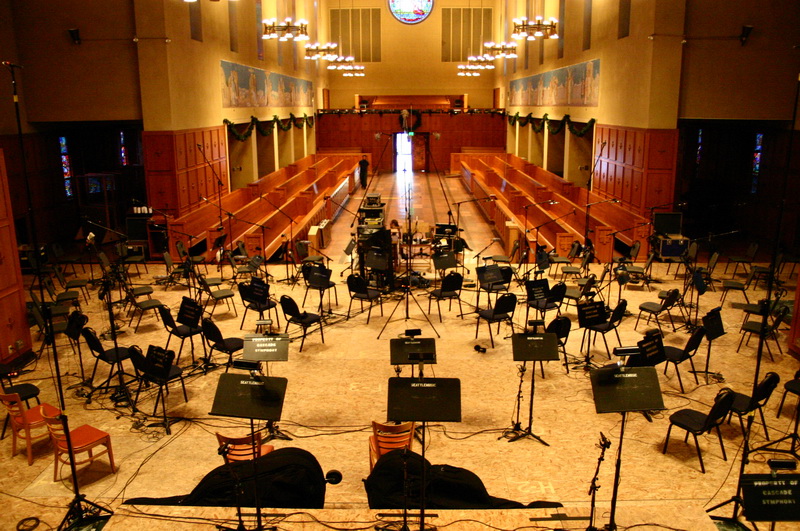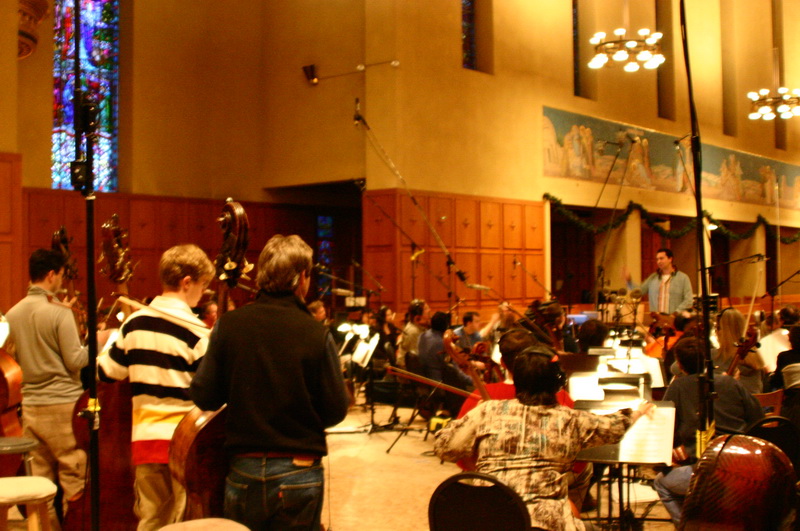We've first met James Dooley's name a few years ago as an additional composer. Hans Zimmer's student debuted this year with his first individual motion picture score, written for Simon West' When a Stranger Calls. His latest work is the animated short First Flight, which will be shown before DreamWorks' Over the Hedge. We asked the young composer about these works and the rest of his career.
If you don't mind, we'd like to begin our interview from the early days. The first assignment in your scoring career was the 1999 short The Good Man's Sin, which was followed by many similar projects (Agua Dulce, Smooth). What kind of musical preliminary studies did you have before your first project, and which productions and composers influenced you to write scores?
There were actually many scores before that one, it just happens to be the first one listed on the imdb. Those projects were also short films as well, most of them being for NYU and USC students in my undergraduate and graduate studies. At NYU I studied classical theory and composition. I continued those studies at USC with such composers as Leonard Rosenman, Christopher Young, David Raksin, and Elmer Bernstein among others.
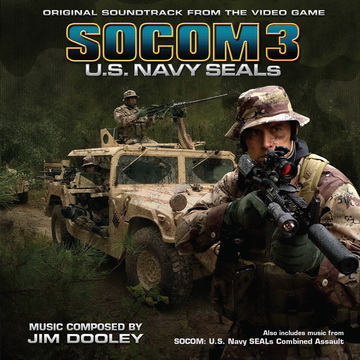 What are the working phases in your process of composing? What kind of softwares do you use and in what ratio do you mix the orchestra and the samples? What are the key factors in deciding on how many musicians to be featured and how many electronic elements to be used in your scores?
What are the working phases in your process of composing? What kind of softwares do you use and in what ratio do you mix the orchestra and the samples? What are the key factors in deciding on how many musicians to be featured and how many electronic elements to be used in your scores?In the beginning of scoring a project I do a lot of research and study. For example, in Socom 3: US NAVY SEALs, the game took place in three different world locations which needed to be addressed sincerely and be instrumentally appropriate. That's the research part of the process. I use Cubase on a PC these days for sequencing. I have a lot of PCs running Gigastudio and other sampling software in addition to a mac with Pro-Tools on it as my mixer.
The film always dictates what styles and musical textures can be used in the score. This is then focused with the help of the director and sometimes film editor as well. Mixing samples and non-sampled material into a score is hard to describe. With purely orchestral scores, I like not to use samples if that is what the film can hold. Projects that are supernatural in nature can seem to stand more sample usage than others.
Would you tell us how you became a member of Remote Control Production (former Media Ventures), lead by Hans Zimmer?
I began there as chief technical assistant to Hans on Gladiator. I did that for two years before changing over to full time writing. I would balance my year doing work on Hans' projects as well as my own. I was contacted by Hans' team through a very bizarre set of circumstances but the short story is it had a lot to do with the people I've met through my time at NYU and USC as well as hustling up part-time jobs in LA.
Remote Control Production unites more talents. How does the management chose which artist could join the company and how do they hand out the projects to the composers?
It doesn't actually happen like that. It's a big misconception that there is a management team that picks composers and then assigns them work. Composers are asked to join, usually after working in technical capacities for existing composers after a long tenure. Traditionally it has been 3 to 5 years. It's all about service and dealing with the pressure and long hours. It's like boot camp. No one wants you to go to war without the proper training. For example, owning a gun doesn't make you a soldier, you need training. Projects aren't handed out to people either. It's about working with people and developing relations ships over time. You must earn trust and deliver and that takes time to prove to people.
Your name has appeared in many variations (such as James Dooley, Jim Dooley, James M. Dooley) during the credits. Why is this? Isn't it a disadvantage if a composer's name appears in a different form in various projects?
This is just because I was an idiot. My credits used to be Jim because that is what my friends call me. I was suggested to use my actual name and not the informal one by some people. So, I did that. Then I added my middle name like James Newton Howard. But now it's just James Dooley. The name I sign on everything anyway. That debate is now over and thank god for that.
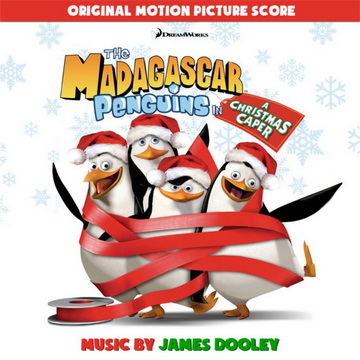 You've written the score for The Madagascar Penguins in a Christmas Caper, a short feature starring the penguins from DreamWorks' Madagascar. Have you integrated the score of the longer feature film into your work? Did it help that you've written the music for some of the scenes of Madagascar?
You've written the score for The Madagascar Penguins in a Christmas Caper, a short feature starring the penguins from DreamWorks' Madagascar. Have you integrated the score of the longer feature film into your work? Did it help that you've written the music for some of the scenes of Madagascar?I was asked to score, The Madagascar Penguins in a Christmas Caper. Because I had written all the music for the penguins in the feature length, Madagascar. Working on Madagascar was great in that the people on the productions for both projects were the same and it made the process very easy and fun.
After the short about the penguins, you'll write the score for First Flight, which will be a short played before the animated feature, Over the Hedge. Have you ever thought about producing a compilation album from the pieces of music from the shorts and your orignal trailer compositions (Harry Potter and the Goblet of Fire, King Arthur, The Da Vinci Code)?
I would love to release an album with all those pieces on it. It might be difficult in that all of them are owned by different studios but I will do my best to make it happen!
Video game music has gone through a great evolution in the last few years, but its structure is very different from movie scores. You've composed two video game scores so far (Dead to Rights II, Socom 3: U.S. NAVY SEALs). In what way is the process of composing different in video games when compared to movies?
Scoring films is inherently different because it has a determined time line. The length of the film doesn't change due to who's viewing it. You can be very specific for the music that everyone will experience in a film. In a game like Socom 3: US NAVY SEALs, the game's music has to be dynamic so that each player has an interesting experience no matter how slow or fast they move through the game. There is a bit of random music built into the game to simulate an actual scored experience. That is very challenging. It forces you to create so much music because there are so many conditions that can be explored. No one gets it right the first time, so you reward success and downplay failure.
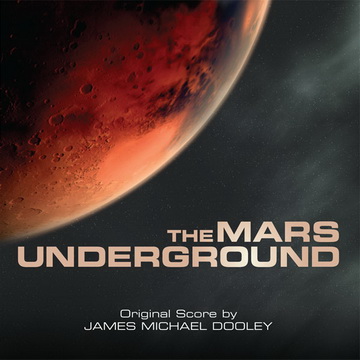 The picturesque view and topic of the documentary Mars Underground makes one's imagination fly. Were the producers strict with their demands on the score, or did they let you go and free your mind about this concept?
The picturesque view and topic of the documentary Mars Underground makes one's imagination fly. Were the producers strict with their demands on the score, or did they let you go and free your mind about this concept?I was allowed a good amount of freedom on that one. We did agree that there was to be a certain minimalist feel to it and to bridget pur orchestra with electronics as well. We needed it to be emotional and also represent the technological challenges to be overcome to have a successful journey to the planet Mars.
One of your latest work is Simon West's horror/thriller, When a Stranger Calls. How did you get into this project? What elements and composing techniques of this specific genre have you followed?
I was asked to pitch some existing music of mine with some other composers in LA through my agent, Cheryl Tiano. It was very odd in the sense that I the powers that be went through the music and picked me solely based on the music at that point. It doesn't often happen like that. Usually they've heard a previous project or met a previous client and referrals seem to take priority.
I am a horror movie fan anyway, so when I saw it for the first time, it was fairly clear what it needed. The film was to have more of a classic style score because of the amount of tension it required over time.
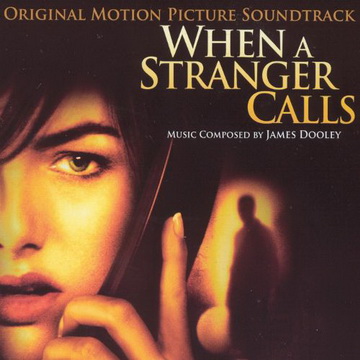 It frequently happens that parts of a horror score turn into musical chaos. The score to When a Stranger Calls can be divided into two parts too – more mystical motives and some disturbed moments that match the on-screen action. In the latter cases, did you have any previous concepts on paper, or did you improvise more during the recording sessions?
It frequently happens that parts of a horror score turn into musical chaos. The score to When a Stranger Calls can be divided into two parts too – more mystical motives and some disturbed moments that match the on-screen action. In the latter cases, did you have any previous concepts on paper, or did you improvise more during the recording sessions?I worked with my orchestrator and we recorded a huge amount of very specific aleatoric, and chaotic elements so I could be as specific as possible in the score. This style of music requires pin point accuracy with the more 'wild' elements. You can't just do, blaaaaah! We recorded two different string orchestras in Prague. The first was a big standard section with a harp, and the second was celli and basses only. These samples were used in my mockup presentations for the Simon West and other 'Stranger' parties, and they mostly didn't get replaced by the time we went to record everything else in Seattle upon completion.
You are frequently collaborating as an additional composer, you helped Hans Zimmer with The Da Vinci Code on your last assignment. Aren't you bothered, when people credit your ideas to the composers who were listed more prominently?
It's not exactly as people believe it to be. In all of art, people have been fleshing out ideas of their mentors, for the longest time. It is the best way to learn, clearly. The apprenticeship system has been in place from painting, to sculpture, to iron working, and cooking. In the specifics of The Da Vinci Code, Hans had already written so much music before I was even asked to participate. It's all about collaboration and making a great product. That's the essence of music.
Apart from the cinematic ventures, you've scored advertisements for many famous companies (Mercedes, Porsche, C&A). These tracks have to be relatively short, yet they must feature some intresting motive that would grab the attention of the viewers. How is composing such a piece is different compared to other assignments and what deadlines are you given by the companies?
Scoring for very short format can be challenging. The deadlines can be very tough as well as the composing process. I very much enjoy working on them as they are often a good break from the long form writing. The challenge is to get as much information in a small space without running at the mouth a mile-a-minute. It's like, how do you pick someone up at a bar the fastest? You have to be cool, calm, and funny, and not be desperate. The information must be concise and laser accurate if you are to succeed.
You've already written music for animation, action flicks, romantic movies, shorts, documentaries, and video games. Which was your favorite genre of these, the one in which you felt most confident?
I really enjoy doing animation. I like doing children's projects for some bizarre reason. I should probably ask a psychiatrist about that! You can be more honest and emotional in children's animation. Scoring First Flight for Cameron Hood and Kyle Jefferson was one of the most fulfilling projects I've ever worked on. I went with my instinct and it was bang on!
Who do you think are the best from the team of Remote Control Productions and why? With which members of the company do you like working the best?
HA! What a good question. The answer is that everone has their individual strengths which are emerging more as well all work together. With which members of the company do you like working the best? I'd say Hans Zimmer. I learn the most from working on his projects and it has opened so many doors for me.
Will you use additional composers in the future and do you plan on giving a helping hand to the next generation?
I'm just starting to get consecutive features and sometimes you get caught with more on your plate than you can handle. Additonal composers can really help out and keep the integrity of the project strong. I am trying to work with more people in collaborative ways instead these days. Finding a unique guitar player or a vocalist and working with them to create new sounds is very interesting and fun to me. Look for these experiments in the near future. My work with Mel Wesson on Bone Dry is going to be a great example of this. Both of us do something totally different and we are better together for this project. It's going to rock!
In what productions will you participate in the near future? When can we listen to your next work?
The album for Urmel Aus Dem Eis will be out this August. I'm so proud of this work and I can't wait to get it out into the world. I am working on a video game right now which has not been announced yet. We are recording the score next month in Prague and we're trying to get the album out by the fall. Stay tuned!
To know more about James Dooley's work, please visit the composer's official website.
Photos from the When a Strangers Calls recording session...
...with the orchestra.
Photos from James Dooley
June 24th, 2006
June 24th, 2006



